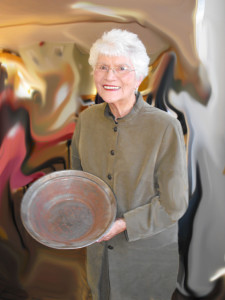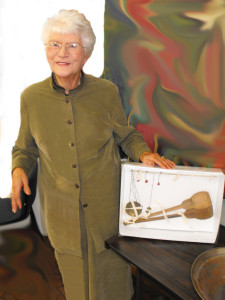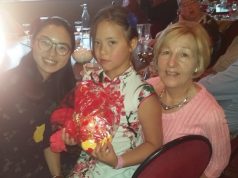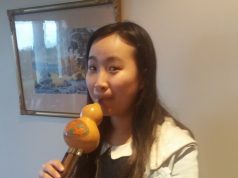In April 2013, members of the Timaru Branch of the New Zealand China Friendship Society were addressed by Mrs Noeline Turnbull (nee Meechang) whose Chinese grandfather was an assisted miner in the Otago Goldfields. It would not be an overstatement to say that the audience was spellbound by her address. You could sense that it was a great relief for this gracious lady to share the often sad and tragic story of her grandfather. A summary of her talk follows.

Grandfather Wong Meechang was born near Canton about 1830 where his family were farmers and rural artisans. He was one of the many assisted Chinese gold miners seeking their fortune in Otago.
When he left, his own country was in upheaval and turmoil, with uprisings, banditry, violence, starvation, and poverty, civil and foreign wars. He was often called on to fight against these foreigners and was a formidable opponent, as he possessed enormous strength, and matter of factly confessed to chopping down seventeen foes in one day.
He came to New Zealand on a temporary basis to make a fortune from gold mining as quickly as quickly as possible and to return to his beloved China, wealthy and able to provide for his relatives as many were living in deprivation and were relying on his money from the gold for their livelihood.
He had a good command of the English language and could read and write English well. On arrival he walked to the goldfields of Lawrence. The miners were hardworking, honest and frugal. They possessed exemplary patience and tolerance but frequently experienced extreme resentment, hostility and often violence from the white settlers, who were also mining for gold. The Chinese miners only worked the ground abandoned by the white settlers. They knew very well that if they attempted to work the rich, virgin land, they would be met with violence.
Grandfather Meechang worked very hard and with very careful saving moved to Invercargill where he was keen to enter the business world. He was able to lease shops, jewellery, gold buying and general store keeping. The shops thrived.
He met a lass from Cornwall, Mary Prudence Hodge. Grandfather proposed to Mary and was accepted. They were married 1879 in St John’s Anglican Church, Invercargill. All went well. The shops continued to flourish. Grandmother was able to afford to have two servant girls to help her in the house as she was expecting their first child.
Suddenly the gambling urge reared its ugly head with Grandfather. Gambling was a great temptation and he was unable to resist gambling every night with dice and cards. Sadly, in a very short time, Grandfather lost all his shops and his home.
With the little money he had left, he had to move to Roundhill. There, he was able to make a fresh start on borrowed capital. He bought a store and a restaurant. During the next few years, there was a degree of stability and four of their children were born there: Richard 1880, Robert 1881, Minnie Salome 1882, Isabella 1884.
However, the gambling obsession persisted. The pattern was repeated. Once again Grandfather and grandmother lost everything; the shop, the restaurant and their home.
They moved to Tapanui and with the last remaining few monies, leased a boarding house. While there, their last son Noble, my own dear father was born. But Grandfather and Grandmother suffered terrible prejudice and violence from the white settlers at Tapanui and their boarding house, which also housed their living quarters, was burned to the ground. They were lucky to escape with their lives.
After this tragedy, the family, walked the twenty miles of rough track to Waikaka, where they settled in the Chinese community of five to seven hundred miners. Grandfather built a sod hut. Squares of earth bound with clay formed the walls. He worked very hard panning and tunnelling for gold and building water races. On special occasions they celebrated with a feast. It usually lasted four to five days, after which each miner returned to his own hut ready to resume work until the next feast day occurred.
Within their own community, the Chinese miners remained aloof as most did not intend to become permanent settlers. Their main ambition was to make enough money from the gold mining to allow them to return home to China to support their families and live comfortably.

Grandfather continued to work very hard, but once again gambling became an obsession. Frequently Grandmother and the children were starving as a result of his gambling. When my Father told me of this, a great sadness came upon him, with great quietness and a deep grief.
But Grandfather was hard and tough. He was proud of his sons; he taught each one to hunt, fish and to swim. He taught his sons to work hard and frequently ordered them to help with the gold panning, tunnelling and digging shafts. The girls were often kept home to gather firewood and carry water for washing. Schooling was infrequent for the children. Money was not always available to pay for the fees.
A frequent visitor to the Chinese miners was the Reverend Alexander Don. He was a missionary to them, appointed by the Presbyterian Church in 1879.
Grandmother was a member of the local Anglican Church. She walked four miles there and back each week to attend the church service. She possessed a timid and gentle nature, but the hard, primitive living conditions, Grandfather’s obsession with gambling, combined with the prejudice, ignorance and ostracism of the white settlers, finally did break her spirit. She neglected Grandfather, the children and all her household tasks. She read the Bible and prayed all day long and her religion became a mania. Grandmother was committed to Seacliff Mental Asylum in 1906. The sons found employment on farms and the daughters were employed as domestics.
Grandfather was often called upon to act as interpreter for the Chinese miners at the local court sittings. He was also asked by the organizer Sew Hoy, to undertake and supervise the exhumation of Chinese bodies for shipment to China. A number of Chinese believed their souls could only find peace in their beloved China. This task required grandfather to be meticulous and exacting. It took almost two years to complete after which He suddenly became old and tired. He was almost seventy years old (thirty three of which he had spent in New Zealand). He said to his son Noble “I am tired; I must go home to China. It was not good for me to marry a white woman. It was too strange and different for your mother.’’
Grandfather’s sons helped to pay the fare to China, and he returned to his beloved China to allow his soul to rest in peace.












